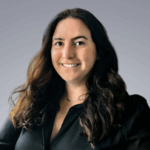Joslyn: Welcome to the PL Reality Check, brought to you by Rivet Education. In just a few minutes, we’ll strip away the buzzwords and get real about professional learning. Each episode brings insider insight from experts and partners, so you can make smarter, faster decisions for your district.
My name is Joslyn Richardson, and I’m the Director of the Professional Learning Partner Guide here at Rivet. Today, we’re chatting with Lauren LeBental, Vice President of SPED Strategies. And she’s going to share more about professional learning for educators who support students with disabilities.
Thank you so much for joining us, Lauren. Before we get started, can you share a little bit about SPED Strategies and the work that you do?
Lauren: Of course, and thanks so much for having me. At SPED Strategies, our mission is to provide the solutions needed at every level of the education system to transform the daily experiences for every student. Since 2020, communities across the country have invited us in, trusting us to help solve real challenges their students with disabilities are facing every day.
For us, this typically looks like professional learning, coaching, or systems improvement at the state, district, or school level. In my role as Vice President, I get to sit at the crossroads of our long-term strategy as an organization and our direct implementation, and I wouldn’t have it any other way. It’s a ton of fun.
Joslyn: Awesome. Let’s dig in. First, why do you think students with disabilities are often overlooked in general professional learning design?
Lauren: This is such a great question. I think what it boils down to is most professional learning approaches are designed with the understanding that there’s a typical or average learner. But research has debunked this myth. We know now that every learner varies, and that educators and the leaders in their buildings are responsible for meaningfully supporting that variance. Unfortunately, traditional approaches to professional learning continue to be designed with this outdated model of teaching to the average learner, or even teaching to the margins, which is a phrase that has popped up recently.
Joslyn: Thank you for that answer. Let’s talk a little more about professional learning design. Can you give us an example of a common gap you see in professional learning focused on students with disabilities?
Lauren: Absolutely. Educators and leaders want to know what to do and want real strategies and tactical solutions. But often we see an overemphasis on finding the “right” answer or “right” strategy for a particular disability type or student. We know all students vary, so there’s no universal right answer that works for everyone. This over-reliance on a set of strategies that should always be used, or a particular strategy for a particular type of disability, is a misconception and a big gap in disability-focused professional learning.
Joslyn: Absolutely agree. It’s important to equip teachers and leaders with an understanding of how adaptive teaching can promote success for all students, including students with disabilities. Let’s shift a little bit to what you’re seeing with providers. What differentiates providers who are truly equipped to serve students with disabilities from those who aren’t?
Lauren: It’s this deep understanding that it’s not just individual strategies that change outcomes for students with disabilities. It’s the systems and conditions in place in schools and districts that allow educators to be successful when adapting instruction. Too often, providers focus only on what individual educators need, maybe even at the lesson level, without addressing the broader conditions. Really equipped providers think about both the macro and the micro, supporting in both areas simultaneously.
Joslyn: Yes. This makes me think about district purchasing decisions and their internal capacity to deliver quality professional learning. In one sentence, what’s at stake if districts don’t invest in effective professional learning for students with disabilities?
Lauren: If districts don’t invest in effective professional learning focused on students with disabilities, they perpetuate an outdated model where general education and special education teachers are trained separately, leading to a fractured system of support.
Joslyn: Yes. Well, thank you so much, Lauren, for your insight into this very important topic. This concludes our time today. Listeners, tune in for part two of our conversations, where we’ll explore questions that separate real expertise from lip service. Thank you.
Lauren: Thanks so much, Joslyn.




